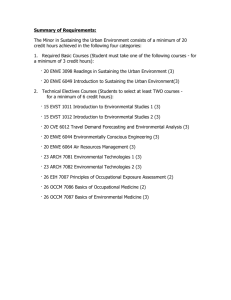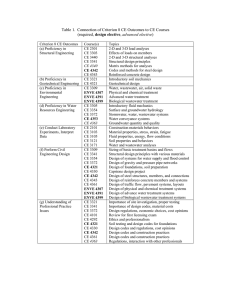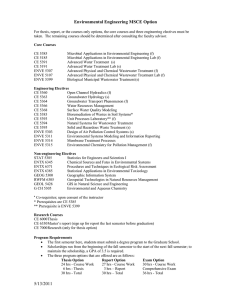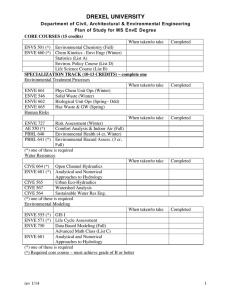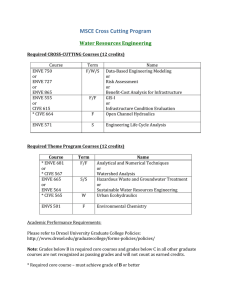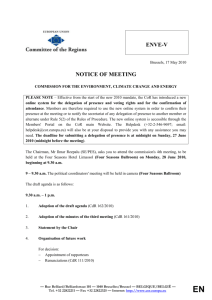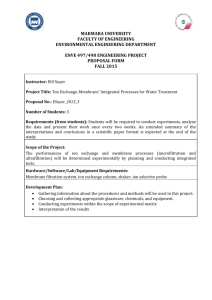Document 12063317
advertisement
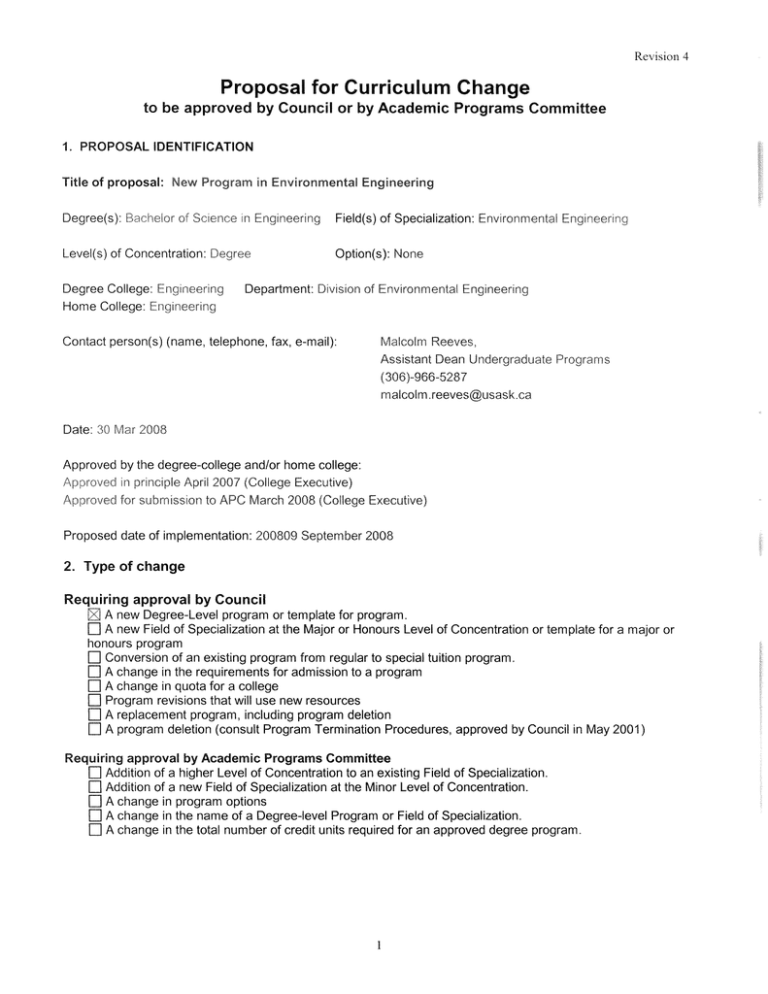
New courses: ENVE 300.3 Principles of Environmental Design Prerequisite: ABE 295 or CE 295 or CHE 220; BIOL 120;CHEM 115; GE 121 Population, economic growth, industrialization and energy use as causes of environmental pollution. Mass and energy balance for environmental engineering systems under steady state and unsteady state conditions. Contaminant partitioning and transport in air, water and solids. Application of environmental principles (technical and non-technical) to water resource management, water and wastewater treatment, air pollution control, solid waste management, environmental impact assessment, and environmental ethics. Thermal pollution, noise pollution, greenhouse effect, acid precipitation, ozone depletion, air toxics, and ground-level ozone and fine particulates (photochemical smog). Sustainable development and life cycle analysis. Review of the principles of environmental quality objectives, standards and guidelines. ENVE 495.6 Capstone Design Project Prerequisite: ABE 295 or CE 295 or CHE 220; RCM 300; GE 348; and 90 credit units toward BE degree. A final design course in which advanced principles of design are learned by application to a suitable environmental engineering project. Projects normally involve interaction with industrial sponsors who act as clients. The course requires that students work in groups. Group interaction and performance is monitored throughout. Guest lectures from various industrial and regulatory representative will be provided to enhance the students’ design experience. From: Fornssler, Cathie Sent: Tuesday, April 22, 2008 7:45 PM To: Malcolm Reeves Cc: trever.crowe Subject: RE: Environmental Engineering Submission to APC The proposal for a program in Environmental Engineering was discussed at the April 11 meeting of the Academic Programs Committee. The Committee felt that consideration in depth might be premature at this time, for the following reasons: 1. It was noted that the proposal has been approved by the Engineering executive, but it has not received formal approval by the College. The Committee agreed that we would like to receive confirmation that the proposal had received approval by the college faculty. 2. Additional information should be included in the proposal document or in a covering memo on the following points: - It appears the initial group of students would be from existing Engineering programs. Does the proposal create a strong program which adds value, i.e incremental student numbers? - The proposal document should include a discussion about perceived or real competition between U of S and U of Regina in terms of offering an environmental engineering program. - The document is unclear regarding the extent to which the Colleges of Arts & Science, and Agriculture & Bioresources have been involved with this program, in terms of resources. 3. The Committee was informed that PCIP had not considered the request for funding of this initiative. Are the resources required for this program in place? The Committee asks that you update the proposal, with specific attention to the points above. If you need more information about the issues of concern to the committee, please contact the committee chair, Trever Crowe, or you could attend an APC Executive meeting. Cathie Cathie Fornssler Committee Coordinator Office of the University Secretary 218 College Building University of Saskatchewan Saskatoon SK S7N 5A2 phone (306)966-5036 fax (306)966-4530 1 MEMORANDUM To: Cathie Fornssler; Committee Coordinator, Office of the University Secretary From: Malcolm Reeves; Assistant Dean Undergraduate Programs, College of Engineering Re: Environmental Engineering Submission to APC Date: May 5, 2008 1. Approval of Program The formal approval of the final submission of the Environmental Engineering proposal is on the agenda of the May 9, 2008 meeting of the Engineering Faculty Assembly. [Note: It was accepted in principle by Faculty Assembly in 2007] 2a. Incremental Student Numbers The College of Engineering does not propose to increase its first-year admission quota (410 head count) because of laboratory and classroom space limitations. The Environmental Engineering program is expected to increase retention of students in upper years from 295 to 320 (headcount) as a result of being better able to satisfy students' preferred choices of program. The net increase in FLEs for the College is expected to be in the range of 50-60 (5%). There is an additional net increase in FLEs outside the College of about 15. Engineering expects to maintain first-year enrolment at 410 over the next 10 years despite the declining high-school demographic. 2b. Environmental Systems Engineering (EVSE) at U of R The following is extracted from the EVSE website: "The EVSE program is popular with students and respected by practitioners because of its timely combination of environmental orientation and the systems approach to regional services engineering. ………………….. The EVSE graduates are able to plan, design, evaluate and optimize engineering services, with particular emphasis on environmental issues such as water, wastewater, solid waste, air quality, groundwater contamination, geotechnical, transportation and sustainable development………… The EVSE program prepares graduates for careers in environmental engineering in all sectors, including government, industry and engineering & consulting firms." EVSE is a traditional Environmental Engineering curriculum with its roots in the municipal aspects of Civil Engineering and the sub-disciplines of sanitary and wastewater engineering. The proposed program at U of S is unique and the most multi-disciplinary environmental engineering program (ENVE) to be offered in Canada. • Students will complete their second-year one of three major engineering disciplines: Bioresources, Chemical and Civil. In third and fourth years, they will bring three very different engineering perspectives to their common environmental program. • Interaction between these students with their exposure to different engineering approaches in the foundational second-year is a truly unique and powerful feature of the ENVE program. 2 • • • Required and elective courses in the proposed ENVE program are drawn not only from Bioresources (ABE), Chemical (CHE), Civil (CE) and Geological GEOE) Engineering but from Biology, Biochemistry, Chemistry, Geography, Geology, Microbiology and Toxicology. The availability of strong courses the physical and life sciences on the U of S campus gives the ENVE program both depth and much greater breadth than the U of R offering. The U of R program concentrates on "environmental orientation and the systems approach to regional services engineering". This is a subset of the scope of the proposed ENVE program that deals extensively with environmental issues in the agricultural, mining and petroleum industry in addition to the urban and municipal waste problems that form the core of the U of R program. The growing demand for environmental engineers is such that both U of R and U of S will be able to fill their respective programs. 2c. Involvement of Arts & Science and Agriculture & Bioresources Both Arts & Science and Agriculture & Bioresources were consulted at an early stage in the development of the program and made suggestions that have been incorporated in the final proposal. Estimates of the total incremental impacts on courses outside engineering for the final proposal were judged to be minimal in most cases. Preliminary discussion took place when the proposed program has less elective flexibility and impacts were larger. First, it is necessary to separate the impact of the ENVE program from the current enrolment overload that engineering is experiencing. The 2007-first-year cohort of almost 500 has stretched resources in several Arts & Science departments, notably Geology and to a lesser extent Chemistry, Computer Science and Mathematics. In the next session, the addition of BIOL 120 as a first-year elective in Engineering will also impact Biology. None of these impacts are related to the Environmental Engineering program. In terms of resources, the ENVE program will have a relatively limited impact on other colleges because it mainly involves redistributing students between existing engineering disciplines into ENVE with no change in the total number. • Adding ENVE will certainly cause no incremental impact in first-year. • In upper years, no additional quota will be provided for ABE (32), CHE (65) or CE/GEOE (90) but the existence of ENVE is expected to result in these quotas being closer to their upper limits under normal enrolment conditions. • All required courses outside engineering for ENVE are either required (or electives) in the existing ABE, CHE and CE/GEOE programs. • As a result the expected additional resource impact is either zero (where the course is required) a fraction (where the course is an elective) of the incremental headcount for ENVE (30). • For required courses, the anticipated incremental additional enrolments were judged to be minimal in comparison with the availability of places for the courses involved. Brief discussions too place with Acting Associate Dean Aiken. • For electives in the ENVE program, the anticipated incremental additional enrolments were again judged to be minimal although enrolments in many of these courses are relatively small. The final version of the ENVE program increased the number of 3 electives to provide flexibility to students and avoid potential overload of courses. If enrolments in ENVE exceed expectations, the College will negotiate acceptable numbers with the units responsible for delivery of these courses or add more courses to the elective list. Again brief discussions took place with the Associate Deans responsible for undergraduate programs (and several electives were added to the list as a result of the consultations with the College). Required ENVE Courses Required Incr. Total Places (all sects) CMPT116 0 240 BIOL120 7 1245 CHEM115 5 707 CHEM242 20 112 CHEM 250 20 850 GEOL121 3 407 • Elective ENVE Courses Elective Incr. Total Places (all sects) BIOC212 8 240 BIOL253 12 153 CHEM221 10 140 FAMS212 9 160 GEOL329 11 GEOL413 10 20 TOX301 11 40 TOX301 was discussed at length with the Centre for Toxicology and was originally planned as a required course. GEOL329 has never been offered and may be deleted and GEOL413 is offered in alternate years. With the exception of BIOL253 all the ENVE science electives are included as electives in ABE, CHE or CE/GEOL. 3. PCIP Consideration of Funding. The College identified the Environmental Engineering program and a Student Services Centre as important initiatives in the Second Integrated Plan. When the plan is finalized, he College will submit requests for funding for both initiatives to PCIP for consideration. Both of these initiatives request additional resources for undergraduate programs and services. Whether or not either or both of these initiatives are funded, the College is committed to the program and will provide the resources necessary resources. The ENVE program will be subject to an accreditation review (in the year of the first graduate) and one of the conditions of accreditation is that the program is adequately resourced. Even though the College is confident that there is a strong case for PCIP to fund the Environmental Engineering program based on the university-wide focus on environment and sustainability and the anticipated incremental tuition revenue, the College will commit to funding the program from its own resources. A memo from Dean Kozinski committing the necessary financial support and teaching resources to the Environmental Engineering program is attached. 4
